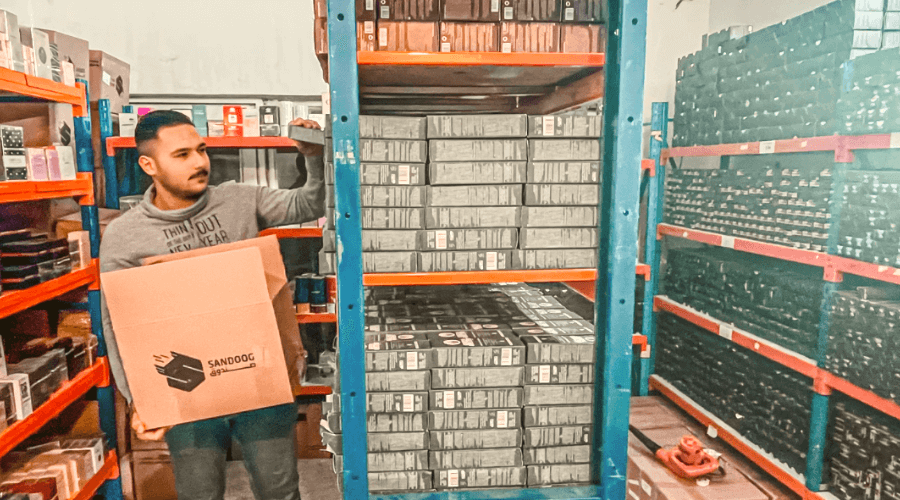Sandoog: Enabling e-commerce in Iraq

For many, Iraq still conjures up visions of war, struggle and corruption. Life, admittedly is not the easiest in the country, but beyond the political and social difficulties, there is a burgeoning startup scene powering through. Many young Iraqis, educated abroad, have returned to a market ripe for digitisation. Entrepreneurs like Mustafa Al Obaidi, who grew up and was educated in the UK have found in Iraq the first mover’s opportunity among a population that is young and tech savvy.
There is a particular trajectory that most markets take when internet penetration begins to rise. Initially, users join messaging apps and social media networks, communicating with friends and family and then eventually with businesses – paving the way for e-commerce. In Iraq, like most nascent ecosystems around the world, much of this e-commerce is done on platforms like Facebook and Whatsapp – a form of social selling. The transactions however, mostly take place offline with buyer and selling meeting in person and the goods bought in cash. Eventually, this entire process is digitised as logistics and fintech come into play.
Noticing a lack of a logistics player in Iraq, Al Obaidi launched Sandoog, focusing initially on the last mile deliveries – delivering a product from business to consumer through a crowd-sourced pool of delivery drivers.
“E-commerce in Iraq is like a digital bazaar, it is social selling. People want personal relations with the person selling and the merchants have the stamina for this,” he says. “The first thing we needed to do was to tackle the culture, which wasn’t digitised. We introduced digital solutions to manage how our business was run and how clients managed their orders.”
Social selling relies heavily on trust – there is no tracking, no receipts and everything is done manually.
“The limitation of that is scale,” according to Ahmed Malik, CTO of Sandoog, who adds that merchants struggle due to lack of infrastructure to allow them to move beyond social selling.
“None of these businesses thought about scaling, there were thousands of these merchants selling products [this way],” says Al Obaidi. “The context of Iraq cannot be detached from any economic issue, the people are in a survival state and that plays hand in hand with someone saying ‘I’m happy with the current situation’.”
Sandoog began offering these merchants a full suite of logistics solutions, which Al Obaidi believes provided structure to the market. It evolved beyond last mile delivery to offer warehousing, fulfilling e-commerce orders, delivering them and managing cash on delivery (COD).
“The demand has increased and the eyes on Iraq from international brands have increased,” he says. “Social selling is still huge, but it has evolved. There are e-commerce players coming in having to adapt to the local way of selling goods. We’ve got enterprises that came from the UAE and are not used to that level of engagement with the consumer. Here [in Iraq], you have to build a relationship.”
Buyers in Iraq still like to haggle, which is at odds with modern forms of e-commerce, which feels impersonal according to Al Obaidi, but this culture is shifting as consumers begin to adapt.
Sandoog has worked with several regional and international brands to help them penetrate the Iraqi market. Of its 100+ merchants, 30 per cent are international including Philips and Sketchers.
“We have built a whole ecosystem for this, we had to build something that was locally relevant, we couldn’t buy off-the-shelf,” says Al Obaidi. “The size of Iraq as a market, the cultural nuances in society were a huge part of [the journey].”
Iraq’s challenges are unique to the country, in the north stands Kurdistan, a semi-autonomous state with a precarious relationship with Baghdad. Startups not only have to deal with two different jurisdictions, but two different languages and cultures too.
“There are challenges from a social standpoint and geographically in terms of movement of goods. Everything gets checked between Kurdistan and Baghdad,” says Al Obaidi.
For both Sandoog and the merchants, these controls lead to lost sales and returns.
“We handle the lead, the sale happens when the driver delivers [the product] and gets the cash. What you have right now is a lead and any delay could lose a sale,” he adds.
The overwhelming majority of transactions are still conducted in cash, making cancellations more likely. The national return rate currently stands at 40 per cent.
“You have the customer, the driver, the person collecting the cash and paying it to the merchant. All these processes have to be monitored and tracked to create trust,” says Malik. “The [prevalence of cash] forced us to implement an arm of fintech. We introduced an e-wallet that everybody involved in the cash management can access.”
In a country where credit card penetration is low, e-wallets have proven to be a practical solution to the cash problem.
“You can be brilliant at sales and acquiring customers, but at the end of the day, if you don’t safely secure your payment, it is a huge problem,” says Al Obaidi.
Looking ahead, Sandoog is raising $2 million for its Series A round.
“We have been bootstrapping. The company generated revenue from day one, we were able to put money back into the company to grow it. The growth has been impressive in terms of what we have been able to do in Iraq. Now the potential is huge, we are in the best position to convince a lot of investors. The next stage is to scale up,” says Al Obaidi.


